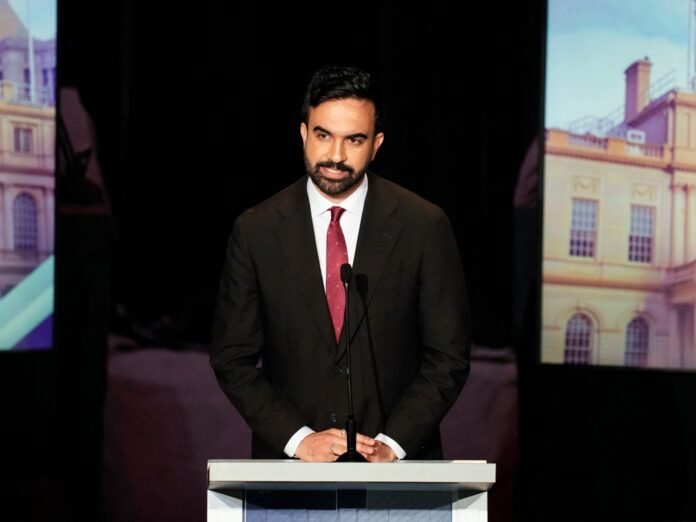Sitting in northern Europe, I shouldn’t care about the New York mayoral race.
Yet, despite all that is happening in the world, the contentious Democratic primary for the 2025 New York City mayoral election has found its way into conversations around me – and onto my social media feed.
This attention isn’t just another example of the New York-centric worldview famously skewered in Saul Steinberg’s 1976 New Yorker cover, View of the World from 9th Avenue. A genuine political struggle is under way, one that has the potential to reverberate far beyond the Hudson River. At its centre is the increasingly polarised contest between Andrew Cuomo and Zohran Mamdani.
The name Cuomo may ring a bell. He resigned as New York’s governor in 2021 following multiple allegations of sexual harassment. While he expressed remorse at the time, his political comeback has been marked by defiance – suing one of his accusers and the state attorney general who found the accusations credible. He claims the scandal was a “political hit job”.
Cuomo’s record in office was far from unblemished. He diverted millions of dollars from the Metropolitan Transportation Authority (MTA), jeopardising the financial health of New York’s essential public transit system. He formed the Moreland Commission to root out corruption but disbanded it abruptly when it began probing entities linked to his own campaign. During the COVID-19 pandemic, his administration was accused of undercounting nursing home deaths, allegedly to deflect criticism of policies that returned COVID-positive patients to those facilities.
Given that legacy, one might imagine Cuomo’s chances of becoming mayor would be slim. Yet, he currently leads in the polls.
Close behind him is Zohran Mamdani, a Democratic Socialist and state assemblyman from Queens. When he entered the race in March, Cuomo led by 40 points. A recent poll now puts Mamdani within 8 points.
Born in Kampala and raised in New York, Mamdani is the first Muslim candidate to run for mayor of the city. But his significance extends beyond his identity. What distinguishes Mamdani is his unapologetically progressive platform – and his refusal to dilute it in the name of “electability”. His appeal rests on substance, charisma, sharp messaging, and a mass volunteer-led canvassing operation.
At the heart of Mamdani’s campaign is a vision of a city that works for working-class New Yorkers. He proposes freezing rents for all rent-stabilised apartments, building 200,000 affordable homes, creating publicly-owned grocery stores “focused on keeping prices low, not making profit”, and making buses free. He supports free childcare for children under five, better wages for childcare workers, and “baby baskets” containing essentials for new parents.
To fund these initiatives, Mamdani proposes increasing the corporate tax rate from 7.25 percent to 11.5 percent, and imposing a 2 percent income tax on New York City residents earning more than $1m annually.
He also wants to raise the minimum wage, regulate gig economy giants like DoorDash, and protect delivery workers. His plan to establish a Department of Community Safety would shift resources away from traditional policing towards mental health and violence prevention.
He further promises to “Trump-proof” New York by enhancing the city’s sanctuary status, removing ICE’s influence, expanding legal support for migrants, defending LGBTQ+ rights and protecting reproductive healthcare access.
But championing such bold policies – as a brown, Muslim candidate – has made Mamdani a lightning rod for hate. Recently, in a rare show of emotion, Mamdani teared up while recounting threats he has received: “I get messages that say the only good Muslim is a dead Muslim. I get threats on my life … on the people that I love.”
The NYPD is investigating two voicemails from an unidentified caller, who labelled Mamdani a “terrorist”, threatened to bomb his car, and ominously warned: “Watch your f..king back every f..king second until you get the f..k out of America.”
Cuomo’s campaign has also played into Islamophobic tropes. A mailer targeting Jewish voters from a Cuomo-aligned super PAC doctored Mamdani’s photo – darkening and lengthening his beard – and declared that he “rejects NYPD, rejects Israel, rejects capitalism and rejects Jewish rights”.
Much of this centres on Mamdani’s outspoken support for Palestinian rights. He has been criticised for refusing to affirm Israel’s right to exist as a Jewish state and for defending the slogan “globalise the intifada”, which he describes as “a desperate desire for equality and equal rights”. He also noted that the Arabic term intifada has been used by the US Holocaust Memorial Museum to describe the 1944 Warsaw Uprising.
Despite the attacks, Mamdani’s movement is surging. He has received endorsements from Senator Bernie Sanders, Congresswoman Alexandria Ocasio-Cortez, Congresswoman Nydia Velasquez, Attorney General Letitia James, the New York Working Families Party, United Auto Workers Region 9A, and Jewish Voice for Peace Action.
In contrast, Cuomo is backed by major real estate donors wary of Mamdani’s housing agenda. His campaign has received $1m from DoorDash, presumably in response to Mamdani’s proposed labour protections. Other prominent donors include Home Depot co-founder Ken Langone and hedge fund billionaire Bill Ackman – both known for supporting Donald Trump.
Still, Mamdani’s grassroots campaign has continued to gain ground. Whether or not he wins the nomination, his candidacy has already achieved something vital: it has offered proof that an anti-corporate, anti-Trump, community-powered campaign – one rooted in progressive values and refusal to compromise – can resonate with American voters.
But the stakes extend far beyond New York. Across Europe, South America, South Asia and Africa, right-wing populists are gaining ground by exploiting economic precarity, stoking culture wars and vilifying minorities. Mamdani’s campaign offers a clear counter-narrative: one that marries economic justice with moral clarity, mobilises diverse communities and challenges the politics of fear. For progressives around the world, it is a rare and instructive blueprint – not just for resistance, but for rebuilding.
The views expressed in this article are the author’s own and do not necessarily reflect Al Jazeera’s editorial stance.






